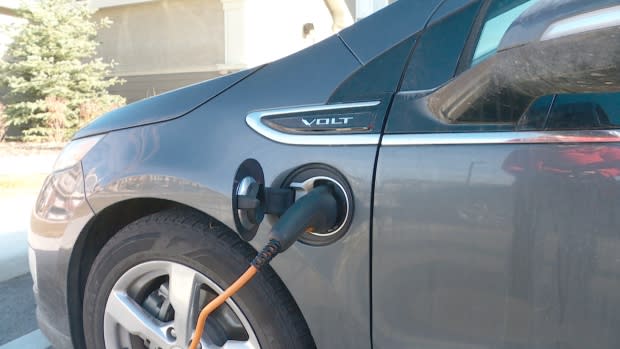Couple in power struggle with condo board over electric vehicle charge
A Calgary couple says they are in a power struggle with their condo board over the ability to charge their electric vehicle.
Kevin Kruse and Sydney Cooper bought a Chevy Volt — a hybrid that runs on gas or electricity — about two years ago, and said at first they had no problem charging the car by plugging it into the 110-volt outlet at their assigned spot.
But things changed about eight months ago after a new condo board president was elected at their building.
Kruse says he woke up one morning to find the power had been switched off. It was eventually turned back on, but with a $33 month bill added to their condo fees.
"I guess he just had a problem with the energy consumption," he said. "Since then, there's been problems."
Binnu Jeyakumar, director of electricity at the Pembina Institute, says as electric vehicles become more and more popular, this kind of conflict will increase.
"To me, stories like this are part of a bigger trend. It definitely is challenging for the people involved right now, but they're trailblazers, and we're going to see more and more of this," she said.
"[Electric vehicle] sales in Alberta have almost doubled since last year, worldwide they're going to go up by tenfold by 2025. By then, gas vehicles are going to cost about the same as electric vehicles."

Jeyakumar says the issue is similar to another technological advancement.
"I think we're in a place where we were when people were starting to bring computers into their homes, and starting to figure out internet dial-up," she said. "Think about what it meant for telecom companies then when they were trying to figure out, 'how are we going to provide this new service, we don't even know what the internet is?' We're at that stage now."
The city is developing an Electric Vehicle Strategy but for now says it's up to condo boards to come up with their own policy around charging.

Eric MacNaughton, who is co-leading development of the electric vehicle strategy as part of the city's Climate Resilience Plan, says home charging was identified as "the most common way that people will charge an electric vehicle."
He adds the city is working with the province and utility providers.
"We're probably going to need a mix of solutions, particularly when you're looking at trying to retrofit existing condo buildings," he said. "When they were first designed nobody was actually thinking about electric vehicles."
MacNaughton says charging an electric car draws about the same amount of power as an oven or a dryer.
"In and of itself, it's not that different from some of these other appliances we already have in condos and homes," he said.
"But at the same time, when you're looking at a pre-existing condo building, every one of them is different so someone would have to do an assessment of how much spare electrical capacity there is or isn't in that building to determine if you can add an electric vehicle charger."
Each of the city's owned parkades is equipped with a charging station, said MacNaughton, and a map of electric charging stations in Calgary can be found online, though many of those were built by private businesses for customers and staff.

